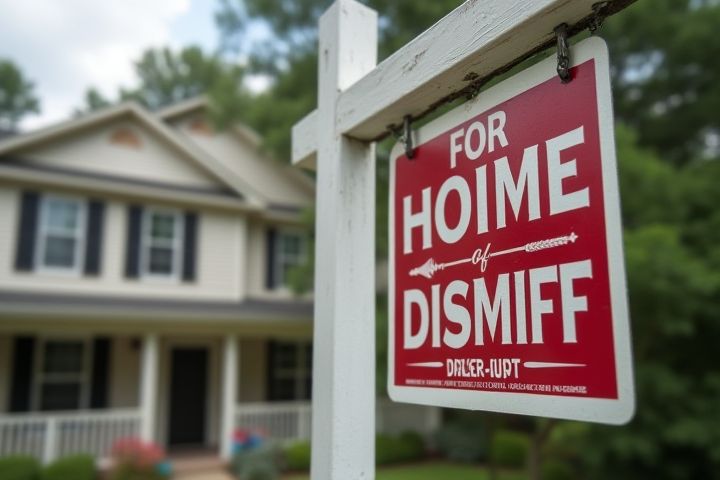
House foreclosures typically occur when homeowners fail to meet their mortgage obligations due to financial difficulties, such as job loss, medical expenses, or unexpected life changes. Lenders initiate foreclosure processes to recover the outstanding balance on mortgages when property owners fall behind on payments, often after several months of missed payments. The foreclosure process can vary by state, encompassing different legal requirements and timelines, which can affect the homeowner's ability to reclaim their property. Economic downturns, increasing interest rates, and declining property values can exacerbate foreclosure rates in specific areas. Understanding the underlying causes of foreclosure can help homeowners take preventive measures to maintain financial stability and housing security.
Why House Foreclosures Happen
Loan Default
House foreclosures primarily occur due to loan default, a situation where homeowners fail to make timely mortgage payments. This financial distress often stems from factors like job loss, medical emergencies, or unforeseen expenses that hinder the homeowner's ability to meet their financial obligations. When loan default persists, lenders initiate foreclosure proceedings to recover the outstanding debt, which can result in the homeowner losing their property. Understanding the reasons behind loan default can help potential buyers manage risks and make informed decisions when securing a mortgage.
Adjustable-Rate Mortgages
House foreclosures commonly occur due to financial strain caused by Adjustable-Rate Mortgages (ARMs). These loans often start with lower interest rates, which can lead to an initial affordability that masks potential long-term risks. As the interest rates adjust, many homeowners face significantly higher monthly payments, making it challenging to keep up with their mortgage obligations. Consequently, if borrowers fail to manage these escalating costs effectively, they may resort to foreclosure, thus losing their home and equity.
Unemployment
Unemployment is a primary factor leading to house foreclosures, as job loss significantly reduces a household's income and ability to meet mortgage payments. When individuals face prolonged unemployment, they often exhaust savings, increasing the risk of default on financial obligations. The resulting stress on family finances may lead to the inability to afford basic living expenses, not to mention housing costs. Understanding this relationship highlights the importance of employment stability and support systems to prevent foreclosure and maintain homeownership security.
Divorce
Divorce often leads to house foreclosures due to the financial strain it places on both parties. As couples separate, they may struggle to manage mortgage payments, especially if one partner relies on shared income that dissipates post-divorce. Additionally, emotional stress can impair decision-making, causing delays in selling the property or refinancing the mortgage. If neither party can maintain the financial responsibilities of the home, foreclosure becomes a painful but often unavoidable outcome.
Medical Expenses
House foreclosures often occur as a result of overwhelming medical expenses that can rapidly deplete savings and disrupt financial stability. When unexpected health issues arise, individuals may face high hospital bills, prescription costs, and out-of-pocket expenses that exceed their budget. As a result, many homeowners struggle to keep up with mortgage payments, leading to late fees and eventually default. If you or someone you know is dealing with high medical costs, proactive financial planning and exploring assistance programs may help mitigate the risk of foreclosure.
Over-leveraging
Over-leveraging occurs when homeowners take on excessive debt relative to their income and property value, making them vulnerable to financial stress. For instance, if your mortgage payment exceeds 30% of your monthly income, it may signal over-leveraging. When economic downturns arise or interest rates rise, you may struggle to meet mortgage obligations, leading to potential foreclosure. According to a 2023 report, nearly 25% of foreclosures stemmed from homeowners experiencing financial strain due to over-leveraged situations.
Housing Market Decline
House foreclosures often occur due to significant declines in the housing market, which can lead to decreased property values and increased financial strain on homeowners. In many cases, when housing prices drop--sometimes as much as 30% within a year--the equity homeowners possess can evaporate, making it difficult to refinance or sell their properties. Rising unemployment rates and stagnant wages, particularly in times of economic downturn, further exacerbate these issues, with nearly 10% of households facing mortgage payment challenges. As a result, you may find that many homeowners, unable to keep up with their mortgage obligations, are pushed toward foreclosure as a final desperate measure.
Natural Disasters
Natural disasters significantly contribute to house foreclosures, impacting homeowners through property damage and financial strain. For instance, after events like hurricanes, floods, or wildfires, repair costs can exceed tens of thousands of dollars, leaving many unable to maintain mortgage payments. A study found that areas affected by natural disasters saw foreclosure rates rise by as much as 20% in the following year. You may also consider that displaced families often struggle to find affordable housing, leading to an increased risk of foreclosure in these vulnerable areas.
Property Tax Increases
Property tax increases can create significant financial strain on homeowners, leading to potential foreclosures if not managed effectively. When local governments raise property taxes to fund public services, homeowners may find their monthly expenses rising unexpectedly, sapping their budgets. If your income does not keep pace with these increased costs, it can become challenging to meet mortgage payments, creating a risk of default. Prolonged inability to pay property taxes can lead to tax liens, which may accelerate foreclosure proceedings if the debt remains unsettled.
Loan Fraud
Loan fraud is a significant driver of house foreclosures, occurring when false information is used to secure mortgage approval. This can include inflated income statements, misrepresented property values, or fictitious identity details, leading to unsustainable loan agreements. When borrowers are eventually unable to meet repayment terms, often due to inflated expectations and unforeseen financial strain, foreclosure becomes inevitable. In 2022, approximately 39% of foreclosures were linked to loans obtained through fraudulent means, underscoring the lasting impact of deceit in the housing market.
